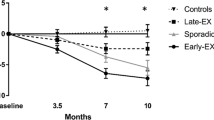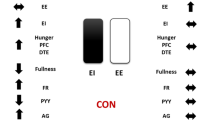Abstract
Objective: To examine the effects of a high dose (two high-intensity exercise sessions) of exercise on energy intake (EI) and subjective states (hunger and mood). Design: Using a within subjects design, there were two treatment conditions, each of two consecutive days. Setting: The Human Appetite Research Unit at Leeds University Psychology Department. Subjects: Eight lean males who were regular exercisers were recruited from the student/staff population of Leeds University. Interventions: The effects of the high dose of exercise on Ex1 were compared with the effects on the day immediately after exercise (Ex2) and two consecutive days of no exercise (R1 and R2). EI was monitored using self-record food diaries and subjective states were tracked using a new Electronic Appetite Rating System (EARS). Heart rate and physical activity were also measured. Results: Feelings of hunger were not elevated by the high dose of exercise on Ex1 or on the day after exercise (Ex2). In fact, average daily feeling of hunger on Ex1 was significantly lower compared with the average daily feeling of hunger on Ex2 (t=3.15, d.f.=7, P<0.05), but not when compared with R1 or R2. EI and macronutrient intakes were not different on Ex1, Ex2, R1 or R2. Therefore, there was no increase in EI on Ex1 or Ex2 to account for the measured increase in exercise-induced energy expenditure (1200 kcal). Continuously monitored heart rate and activity profiles indicated that there was no difference in activity during the non-exercise periods between the four days. Conclusions: This study indicates that a high dose of exercise in one day failed to have any effect on EI within the same day or on the day immediately after exercise, compared with days of no exercise. These results demonstrate that an acute but substantial increase in energy expenditure (EE) due to intense exercise does not automatically increase hunger or EI within 48 h. This indicates the absence of any strong coupling between EE and EI in the short-term, probably as a result of food intake being held in place by environmental contingencies and short-term pre-absorptive physiological responses arising from eating itself. Sponsorship: This experiment was supported by the Biotechnology and Biological Science Research Council (BBSRC) F02501.
This is a preview of subscription content, access via your institution
Access options
Subscribe to this journal
Receive 12 print issues and online access
$259.00 per year
only $21.58 per issue
Buy this article
- Purchase on Springer Link
- Instant access to full article PDF
Prices may be subject to local taxes which are calculated during checkout
Similar content being viewed by others
Author information
Authors and Affiliations
Rights and permissions
About this article
Cite this article
King, N., Lluch, A., Stubbs, R. et al. High dose exercise does not increase hunger or energy intake in free living males. Eur J Clin Nutr 51, 478–483 (1997). https://doi.org/10.1038/sj.ejcn.1600432
Received:
Revised:
Accepted:
Issue Date:
DOI: https://doi.org/10.1038/sj.ejcn.1600432
Keywords
This article is cited by
-
Markers of Low Energy Availability in Overreached Athletes: A Systematic Review and Meta-analysis
Sports Medicine (2022)
-
Diet- but not exercise-induced iso-energetic deficit induces compensatory appetitive responses
European Journal of Clinical Nutrition (2021)
-
Differences in macrophage polarization in the adipose tissue of obese mice under various levels of exercise intensity
Journal of Physiology and Biochemistry (2020)
-
Association of Exercise with Control of Eating and Energy Intake
Current Addiction Reports (2019)
-
The Unexplored Crossroads of the Female Athlete Triad and Iron Deficiency: A Narrative Review
Sports Medicine (2017)



